
The Tragedy of Romeo and Juliet, often shortened to Romeo and Juliet, is a tragedy written by William Shakespeare early in his career about the romance between two Italian youths from feuding families. It was among Shakespeare's most popular plays during his lifetime and, along with Hamlet, is one of his most frequently performed. Today, the title characters are regarded as archetypal young lovers.
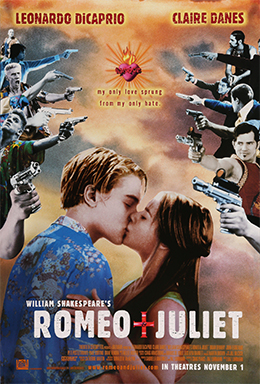
William Shakespeare's Romeo + Juliet is a 1996 romantic crime film directed, produced, and co-written by Baz Luhrmann. It is a modernized adaptation of William Shakespeare's tragedy of the same name, albeit still utilizing Shakespearean English. The film stars Leonardo DiCaprio and Claire Danes in the title roles of two teenagers who fall in love, despite their being members of feuding families. Brian Dennehy, John Leguizamo, Miriam Margolyes, Harold Perrineau, Pete Postlethwaite, Paul Sorvino and Diane Venora also star in supporting roles. It is the third major film version of the play, following adaptations by George Cukor in 1936 and by Franco Zeffirelli in 1968.
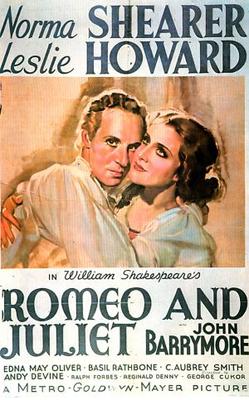
Romeo and Juliet is a 1936 American film adapted from the play by William Shakespeare, directed by George Cukor from a screenplay by Talbot Jennings. The film stars Leslie Howard as Romeo and Norma Shearer as Juliet, and the supporting cast features John Barrymore, Basil Rathbone, and Andy Devine.
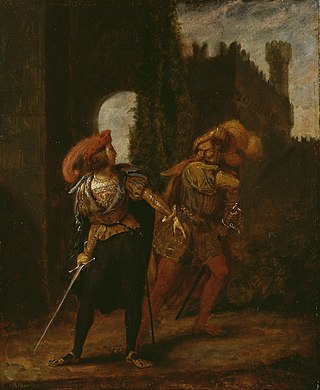
Tybalt is a character in William Shakespeare's play Romeo and Juliet. He is the son of Lady Capulet's brother, Juliet's short-tempered first cousin, and Romeo's rival. Tybalt shares the same name as the character Tibert / Tybalt "the prince of cats" in the popular story Reynard the Fox, a point of mockery in the play. Mercutio repeatedly calls Tybalt "prince of cats", in reference to his sleek, yet violent manner.

Mercutio is a fictional character in William Shakespeare's 1597 tragedy, Romeo and Juliet. He is a close friend to Romeo and a blood relative to Prince Escalus and Count Paris. As such, Mercutio is one of the named characters in the play with the ability to mingle around those of both houses. The invitation to Lord Capulet's party states that he has a brother named Valentine.

Benvolio Montague is a fictional character in William Shakespeare's tragedy Romeo and Juliet. He is Lord Montague's nephew and Romeo's cousin. Benvolio serves as an unsuccessful peacemaker in the play, attempting to prevent violence between the Capulet and Montague families.
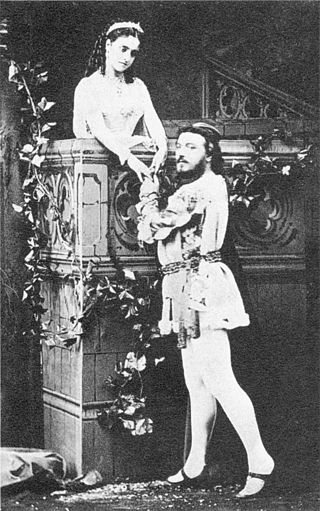
Roméo et Juliette is an opera in five acts by Charles Gounod to a French libretto by Jules Barbier and Michel Carré, based on Romeo and Juliet by William Shakespeare. It was first performed at the Théâtre Lyrique, Paris on 27 April 1867. This opera is notable for the series of four duets for the main characters and the waltz song "Je veux vivre" for the soprano.
Roméo et Juliette: de la Haine à l'Amour is a French musical based on William Shakespeare's play Romeo and Juliet, with music and lyrics by Gérard Presgurvic. It premiered in Paris on January 19, 2001. The production was directed and choreographed by Redha, with costumes by Dominique Borg and settings by Petrika Ionesco. The producers were Gérard Louvin, GLEM, and Universal Music. ! Since then, the musical has been performed in Verona, Rome, Canada, Antwerp, London, Amsterdam, Budapest, Szeged, Moscow, Vienna, Bucharest, Seoul, Pusan, Taipei, Monterrey, Japan, Hong Kong, Shanghai and Portugal and has been translated into several languages, including Dutch, Italian, Hungarian, Russian, English, German, Spanish, Romanian, Japanese, Korean, Portuguese, and Slovak.

Count Paris or County Paris is a fictional character in William Shakespeare's Romeo and Juliet. He is a suitor of Juliet. He is handsome, wealthy, and a kinsman to Prince Escalus.
After Juliet is a play written by Scottish playwright Sharman Macdonald. It was commissioned for the 2000 Connections programme, in which regional youth theatre groups compete to stage short plays by established playwrights.
The Tragedy of Romeo and Juliet is a 1982 film adaptation of William Shakespeare's Romeo and Juliet, directed by William Woodman and starring Alex Hyde-White as Romeo and Blanche Baker as Juliet.

Romeo and Juliet is a 1954 film adaptation of the Shakespearean tragedy of the same name. It is directed and written for the screen by Renato Castellani, and stars Laurence Harvey as Romeo and newcomer Susan Shentall as Juliet, with Flora Robson, Mervyn Johns, Bill Travers, Sebastian Cabot, Enzo Fiermonte and John Gielgud. A British and Italian co-production, it was released in the United Kingdom by General Film Distributors on September 1, 1954.
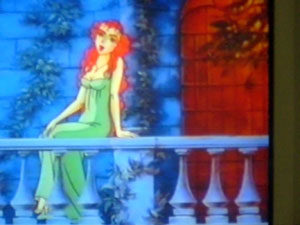
William Shakespeare's Romeo and Juliet may be one of the most-screened plays of all time. The most notable theatrical releases were George Cukor's multi-Oscar-nominated 1936 production Romeo and Juliet, Franco Zeffirelli's 1968 film Romeo and Juliet, and Baz Luhrmann's 1996 MTV-inspired Romeo + Juliet. The latter two were both, at the time, the highest-grossing Shakespeare films. Cukor featured the mature actors Norma Shearer and Leslie Howard as the teenage lovers while Zeffirelli populated his film with beautiful young people, and Baz Luhrmann produced a heavily cut fast-paced version aimed at teenage audiences.
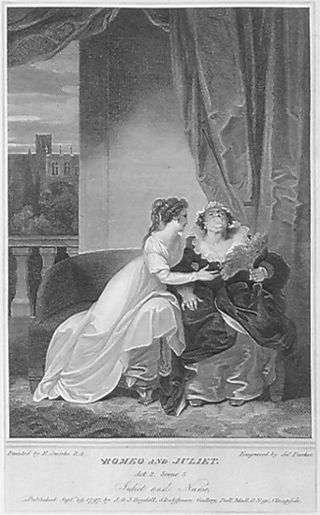
The Nurse is a character in William Shakespeare's classic drama Romeo and Juliet. She is the personal servant, guardian, and former wet nurse of Juliet Capulet, and has been since Juliet was born. She had a daughter named Susan who died in infancy, before she became the wet nurse to Juliet. The Nurse is Juliet's foremost confidante, and consequently very important to Juliet's life.
William Shakespeare's play Romeo and Juliet, set in Verona, Italy, features the eponymous protagonists Romeo Montague and Juliet Capulet. The cast of characters also includes members of their respective families and households; Prince Escalus, the city's ruler, and his kinsman, Count Paris; and various unaffiliated characters such as Friar Laurence and the Chorus. In addition, the play contains two ghost characters and an unseen character (Rosaline).

Romeo & Juliet is a 2013 film adaptation of William Shakespeare's romantic tragedy. Written by Julian Fellowes and directed by Carlo Carlei, it stars Douglas Booth, Hailee Steinfeld, Damian Lewis, Kodi Smit-McPhee, Ed Westwick, Stellan Skarsgård and Paul Giamatti. The film opened in the United Kingdom and the United States on 11 October 2013. While remaining faithful to the original plot, it uses only some of the dialogue written by Shakespeare. This has led to several critics denouncing the film on the grounds that it loses the essence of the play. The film grossed $3 million.

Romeo and Juliet is a lost 1916 American silent film based on William Shakespeare's play, Romeo and Juliet. John W. Noble is credited as director and Francis X. Bushman and Beverly Bayne star as the lovers. This film was produced in 1916, the 300th anniversary of Shakespeare's death, and was released amongst many other commemorations of his works.

Private Romeo is an adaptation of William Shakespeare's Romeo and Juliet by Alan Brown made in 2011. The film is a reenactment of the play exclusively spoken in an all-male high school military academy called McKinley Military Academy. Amidst this recitation is a love blossoming between the two cadets, Sam Singleton / Romeo played by Seth Numrich and Glenn Mangan / Juliet played by Matt Doyle. The film was Brown's take on Don't ask, don't tell, the official United States policy on gays in the military from December 21, 1993, to September 20, 2011.

Still Star-Crossed is an American period drama television series developed by Heather Mitchell and based on the 2013 novel of the same name by Melinda Taub. The series is produced by Shonda Rhimes's Shondaland and ABC Studios, and aired on ABC during the 2016–17 television season. The series premiered on May 29, 2017. ABC canceled the show after one season in June 2017.















